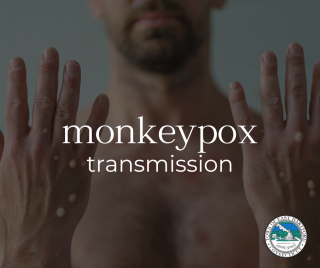Monkeypox Transmission

In the current outbreak, the monkeypox virus (MPX) is spreading mainly through close, personal, often skin-to-skin contact, including:
- Direct contact with MPX rash, scabs, or body fluids from a person with the virus.
- Touching objects, fabrics (clothing, bedding, or towels), and surfaces that have been used by someone with MPX.
- Contact with respiratory secretions
It is also possible for people to get monkeypox from infected animals, either by being scratched or bitten by the animal or by preparing or eating meat or using products from an infected animal. However, MPX is mainly spread through activities such as touching someone’s rash or sores, sharing bedding or towels, or through respiratory droplets (kissing, coughing, sneezing).
It is being spread during sex since it often means having close contact, extended time face-to-face, and touching someone’s sores on their skin, genitals (dick, vulva, testicles), butt (including inside), inside of a vagina/front hole, or mouth. Condoms are not sufficient to prevent MPX transmission. If the rash is only on your genitals or inside your butt, condoms may help reduce the likelihood of developing sores in those areas, which are extremely painful. However, condoms alone are likely not enough to prevent MPX. You still may be exposed if you have skin to skin contact or share bedding/towels.
A pregnant person can spread the virus to their fetus through the placenta.
A person with MPX can spread it to others from the time symptoms start until the rash has fully healed and a fresh layer of skin has formed. The illness typically lasts 2-4 weeks.
Scientists are still researching:
- If the virus can be spread when someone has no symptoms
- How often MPX is spread through respiratory secretions, or when a person with MPX symptoms might be more likely to spread the virus through respiratory secretions.
- Whether MPX can be spread through semen, vaginal fluids, urine, or feces.
For more information about transmission, visit the CDC website or call the East Hartford Health Department at 860-291-7324.

